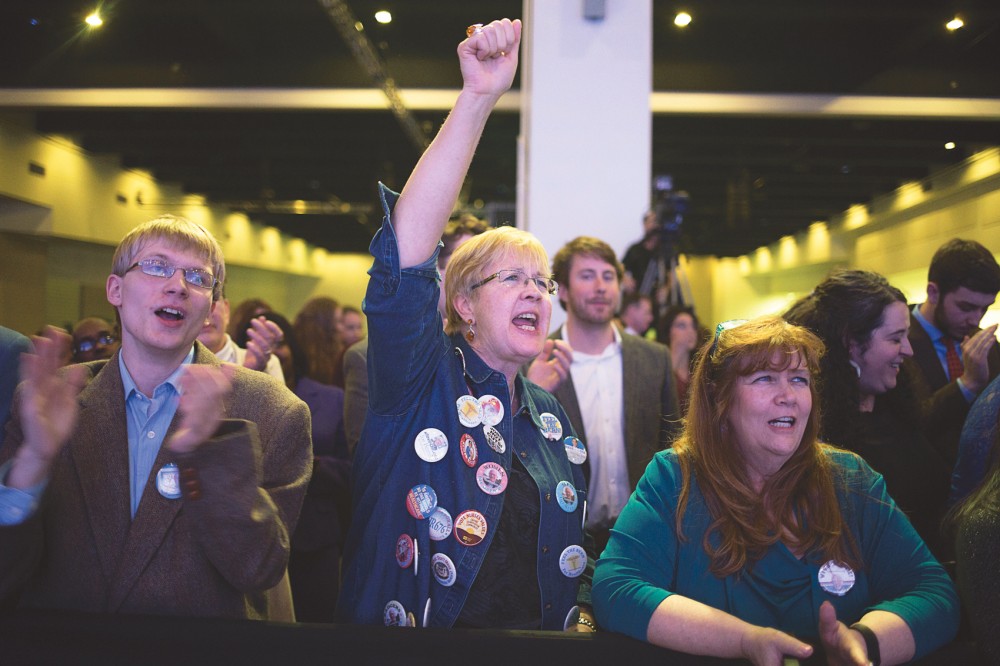Vying for Minnesota’s support weeks before its caucus, Democratic presidential hopefuls, Bernie Sanders and Hillary Clinton, spoke to a crowd of almost 4,000 at a sold-out event on Friday.
Described by some as the “state fair” of Democratic-Farmer-Labor events, the Fifth Annual Humphrey-Mondale Dinner was the largest fundraiser the party has ever had, with proceeds totaling about $1 million, said communications director Rachel Boyer. Tickets for the event at the RiverCentre in downtown St. Paul cost attendees between $50 for bleacher seats and $50,000 for a spot at Gov. Mark Dayton’s reception.
Because its caucus now coincides with several other states’ on Super Tuesday, Clinton and Sanders may be focusing on Minnesota more than candidates have in the past, said Larry Jacobs, director of the Center for the Study of Politics and Governance at the University of Minnesota.
“The democratic battle for presidential nomination is a squeaker,” Jacobs said. “Both candidates are looking for every edge they can get. Minnesota is now in the fight. In past years it was a fly-over state — not this year.”
Excited supporters of all ages came to hear Sanders and Clinton talk about their plans for the presidency.
Jacob Spaulding, University of Minnesota junior and community adviser in Territorial Hall, showed up to support Clinton despite the high cost of attending.
“These things are once in a lifetime,” Spaulding said. “It’s a lot of money, but you do it because it’s part of history.”
Sophi Rothman, 16, came to the fundraiser with her family, including her two brothers Adam and David, who are 13 and 10 years old.
She said that while she prefers Sanders, she would like to see either Democratic candidate elected.
“We all kind of want change,” she said.
Sanders took the stage after several Minnesota Democrats, including Sen. Al Franken, Rep. Keith Ellison and Gov. Mark Dayton. The event was his second appearance in the Twin Cities that day; he also spoke earlier at a community forum in north Minneapolis.
Sanders addressed topics like minimum wage, trade unions, the civil rights movement and gender equality. He also discussed issues like corruption on Wall Street and wealth disparity in the U.S.
He reiterated his stance on political revolution: “Change always comes from the bottom-up.”
Rod Halvorson, a 20-year veteran of the Iowa Legislature and former executive director of the Minnesota Social Service Association, said he showed up to support Sanders.
For Halvorson, Sanders is the only candidate who can fix America’s “broken political system,” he said.
“His belief that our system is corrupt is 100 percent to my belief,” Halvorson said. “I’ve been looking for a candidate to say that all my life.”
Clinton closed out the night after flying in from South Carolina and spoke about universal health care, gender equity in the workforce and her plans to continue with President Obama’s initiatives despite political gridlock.
“When we get knocked down, we get right back up again,” she said.
Though neither candidate directly addressed the other by name, they each spoke about what made themselves distinct.
Sanders said he was the only candidate who doesn’t have backing from super PACs, while Clinton said she wasn’t a single issue candidate and that she had the necessary compromising skills to make change in a bipartisan country.
Rep. Carlos Mariani, DFL-St. Paul, said both candidates obviously did their research to understand the “red meat” issues of the DFL, a historically progressive party.
“I thought they did a good job of just aligning with who we are,” Mariani said.
Rep. Phyllis Kahn, DFL-Minneapolis, said she thought that either candidate could be satisfactory, though she said Clinton’s ability to put forth a progressive message using a specific plan of action outweighed Sanders’ political revolution rhetoric.
“I’ve never felt so much between two candidates that I could be satisfied with either of them in terms of positions and that kind of thing,” Kahn said. “But Hillary is definitely my choice.”
Hearing the candidates speak in person had a significant impact on some attendees.
University senior Jordan Pinneke said she was a Sanders supporter before the event. But she said Clinton’s speech might have shifted that opinion.
“Honestly, as I stood there and watched it, I kind of really listened to her words for the first time,” Pinneke said. “Seeing her speech really kind of changed my views on what she actually stands for.”
Late former Sen. Paul Wellstone surfaced as a topic multiple times, as Clinton, Sanders and various speakers praised him as the one of the most progressive Minnesotan politicians.
Several speakers emphasized the need for a strong voter turnout at the March 1 caucus, regardless of their candidate preference.
Ken Martin, DFL chair, said he expects a “robust” voter turnout of between 150,000 and 175,000 registered Minnesotan Democrats.
“What makes us DFLers isn’t who we are for but what we are for,” Franken said.








